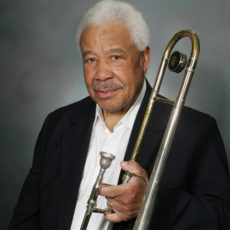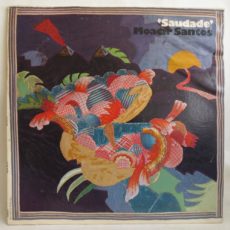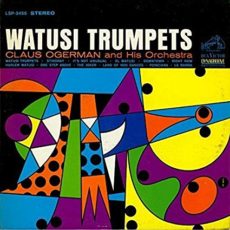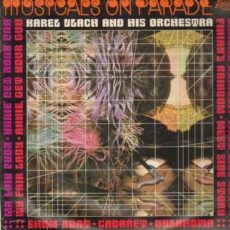
Three Wishes
Tom McIntosh had only one wish when asked by Pannonica:- “To be exactly as the Creator wished me to be. Then everything else would have to be alright.”
More Posts: arranger,baroness,composer,conductor,history,instrumental,jazz,music,pannonica,three,trombone,wishes

Review: Lenora Zenzalai Helm | For The Love Of Big Band
For those of you who aspire to greatness, who challenge your status quo, and who dare to create something majestic, one must dig deep inside for the temerity. Whether you question the audacity of the idea, it takes confidence to even dare the monumental task of bringing nearly four dozen men and women together, producing a unique and innovative big band sound.
Under the auspicious name of The Tribe Jazz Orchestra, vocalist and bandleader Lenora Zenzalai Helm joins the ranks of Lil Hardin Armstrong, Kit McClure, Blanche Calloway, Valaida Smith, Lovie Austin, Sherrie Maracle, and In Ray Hutton among others.
Helm’s debut orchestra project, For The Love Of Big Band, was recorded live in concert over a two day period on March 26~27, 2019 and released on her own label, Zenzalai Music. This album brings new arrangements showcasing legendary composers and big band leaders ~ Nina Simone, Abbey Lincoln, Mal Waldron, Victor Young, John Coltrane, George & Ira Gershwin, Antonio Carlos Jobim, Clifford Brown, and Duke Ellington to name a few.
This twelve composition compendium of classics illuminates the musical genius of those who charted the big band course, laid the foundation and set the standard for this talented vocalist and bandleader to follow in their footsteps. Choosing Blues For Mama, Bebop, Chega de Saudade/No More Blues, It Could Happen To You, Soul Eyes, Everything But You, I Didn’t Know About You, Sandu, But Not For Me, A Conversation With God (Dear Lord), Mississippi Goddam, and Stella By Starlight, she spans several decades, from the Thirties to the Sixties. The music is a mix of jazz standards, brought swingingly to life at the live concert. Helm guided the band through the new arrangements by Stanley Cowell, Cecil Bridgewater, Maurice Myers and Brian Horton
Lenora’s Tribe Jazz Orchestra is composed of twenty-four musicians that include her voice, piano, guitar, bass,drums, reeds, trumpets,trombones and saxophone and orchestra conductor. Her Tribe Jazz Orchestra Septet, pulls three from the orchestra, adds conductor to her voice, along with cello, tenor saxophone, acoustic bass and the NCCU Vocal Jazz Ensemble as guest artists. Other special guests are pianist Joey Calderazzo, Acoustic bassist Ameen Saleem, and Maurice Myers ~ Vocal Soloist on A Conversation With God.
This is a well thought out and produced program of music that will introduce the novice to big band jazz and delight the aficionado who is seeking to expand his/her horizons and include one more big bandleader to their arsenal, who just so happens to be a vocalist, conductor, bandleader, and educator and all woman. I charge you to engage and listen carefully to the maturity of expression that Lenora Zenzalai Helm has put into and extracted from herself and the talented musicians under her purview. This is a wonderful and soulful performance by all accounts and something you will enjoy for years to come.
carl anthony | notorious jazz | february 15, 2020
Give A Gift Of Jazz ~ Share ![]()
#preserving genius
More Posts: bandleader,big band,conductor,history,instrumental,jazz,music,orchestra,vocal

Requisites
Saudade is an album by Brazilian composer Moacir Santos recorded in 1974 and released on the Blue Note label. The album was recorded at United Artists Studios in West Hollywood, California on March 5, 6 & 12, 1974.
The compositions that make up the album are Early Morning Love (Santos, Yanna Cotti) – 3:25, A Saudade Matta a Gente (Antonio Almeida, J. de Barro) – 6:10, Off and On (Santos, Cotti) – 3:37, The City of LA (Mark Levine) – 3:38, Suk Cha (Santos) – 4:06, Kathy (Santos, Ray Evans, Jay Livingston) – 3:37, Haply-Happy (Santos, Petsye Powell) – 2:59, Amphibious (Santos, Assis) – 3:25, This Life (Santos, Cotti) – 2:33 and lastly What’s My Name (Santos, Evans, Livingston) – 3:07.
The players were Moacir Santos – alto saxophone, baritone saxophone, conductor, arranger, Steve Huffsteter – trumpet, flugelhorn, Benny Powell – trombone, Morris Repass – bass trombone, Sidney Muldrow – french horn, Ray Pizzi – bassoon, alto saxophone, tenor saxophone, flute, piccolo, Jerome Richardson – soprano saxophone, alto saxophone, tenor saxophone, baritone saxophone, flute, alto flute, Mark Levine – piano, electric piano, arranger, Lee Ritenour – guitar, electric guitar, John Heard – bass, electric bass, Harvey Mason – drums, Mayuto Correa, Carmelo Garcia – conga, percussion, and Donald Alves, Mike Campbell, Jose Marino, Petsye Powell, Carmen Saveiros, Regina Werneck on background vocals.
More Posts: arranger,choice,classic,collectible,collector,conductor,history,instrumental,jazz,music,saxophone

Requisites
The album by Claus Ogerman and His Orchestra, Watusi Trumpets, was recorded and released in 1965 on the RCA Victor label. All the compositions were arranged, written and conducted by Ogerman, produced by Andy Wiswell and the session engineer was Mickey Crofford. The liner notes were written by Arnold Falleder.
The tracklist includes It’s Not Unusual, Stingray, Watusi Trumpets, El Watusi, Downtown and Right Now on Side A. Along with the B side featuring Harlem Watch, One Step Above, The Joker, Poinciana, La Bamba and Land Of 1,000 Dances. Filled with jazz, rock, soul, lounge and Latin rhythms this is an inspired look at a number of pop, rock, Brazilian and a classic tunes.
Steeped in the music of the Sixties this finger-popping disc may not change your life but just may take you back to those mod years and have you shaking on the dance floor.
More Posts: arranger,choice,classic,collectible,collector,composer,conductor,history,instrumental,jazz,music

Daily Dose Of Jazz…
Karel Vlach, born in Prague, Czech Republic on October 8, 1911 and founded his first orchestra in 1938. Over the years many important composers, instrumentalists and arrangers of the Czech jazz scene went through his band.
From 1947 to 1948 Vlach’s orchestra performed at the V+W Theatre, recorded prolifically with Supraphon and his albums include both light classical, orchestral, jazz and pop arrangements for big band with strings.
During the decades from 1940to 1980 Karel arranged and conducted many Czech film scores, launched the singing careers of Czech artists Yvetta Simonová and Milan Chladil. He and his musical colleagues Dalibor Brazda and Gustav Brom also arranged and recorded many titles that are now a part of the Great American Songbook for British singer Gery Scott in the late 1950s.
Dance orchestra conductor and arranger Karel Vlach passed away on February 26, 1986 in Prague.



